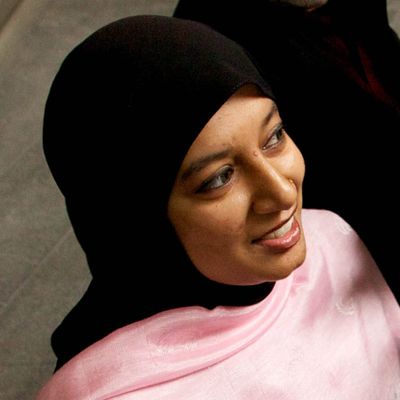
Yesterday, at a Heritage Foundation panel about the Benghazi attacks, a young Muslim law student named Saba Ahmed posed a quiet and thoughtful question. She was met with a furious, emotional response from one of the panelists, and it’s a response that shows the extent to which Ahmed’s behavior — that is, a Muslim presenting herself as an individual, real-life human being asking to be treated with dignity — threatens the scary, overblown stories of anti-Muslim hate groups. It’s a prime example of how interacting with members of an unfamiliar group can short-circuit discrimination directed at its members.
The first panelist to respond to Ahmed’s question, Frank Gaffney, has a long history of hateful rhetoric, but was pretty low key in his answer. It’s when Brigitte Gabriel of the anti-Muslim group ACT! for America starts talking at 4:15 in the below video that things get crazy:
For those who can’t watch, Dana Milbank summed up the exchange thusly:
Ahmed, an American University law student, stood in the back of the room and asked a question in a soft voice. “We portray Islam and all Muslims as bad, but there’s 1.8 billion followers of Islam,” she told them. “We have 8 million-plus Muslim Americans in this country and I don’t see them represented here.”
Panelist Brigitte Gabriel of a group called ACT! for America pounced. She said “180 million to 300 million” Muslims are “dedicated to the destruction of Western civilization.” She told Ahmed that the “peaceful majority were irrelevant” in the attacks of Sept. 11, 2001, and she drew a Hitler comparison: “Most Germans were peaceful, yet the Nazis drove the agenda and as a result, 60 million died.”
“Are you an American?” Gabriel demanded of Ahmed, after accusing her of taking “the limelight” and before informing her that her “political correctness” belongs “in the garbage.”
“Where are the others speaking out?” Ahmed was asked. This drew an extended standing ovation from the nearly 150 people in the room, complete with cheers.
(It should be pointed out that some have criticized Milbank’s account, but having watched the video, I think his summary is fair, other than the fact that he should have mentioned that Gaffney answered Ahmed’s question first, and that Gabriel asked rather than “demanded” to know whether Ahmed was an American.)
Gabriel comes off as a bit unhinged, but her emotional response is, in a sense, justified: The presence of Ahmed threatens the very existence of her group and others like it.
There’s a telling trajectory to the conversation. Ahmed, in asking her question, presents herself as an individual, as resistant to caricature. She’s not some evil, brooding foreigner — she’s a human being suggesting some nuance be injected into the conversation. But if this were about nuance and about individuals, Act! for America and its fearful ilk wouldn’t exist. So Gabriel’s response seeks to zoom back out to a distant, hazy vantage point from which fearful Americans can chatter nervously about hundreds of millions — hundreds of millions! — of Muslims seeking to kill them and their families. It’s no accident that every step of the way she seeks to blur Ahmed, to make her into a vague, anonymous member of an outgroup rather than a flesh-and-blood human. Gabriel seems to feel threatened by Ahmed, and it shows.
This all ties into the “contact hypothesis,” the idea of increasing trust between members of different groups simply by having them interact. While there are specific situations in which it can backfire, overall, a broad swath of research (PDF — the second and third pages have a useful rundown of empirical evidence) suggests that it works. There’s evidence that even imagining an interaction with a member of an unfamiliar group can reduce one’s bias toward that group.
All of this, of course, should terrify the Gaffneys and Gabriels of the world. Their livelihood depends on Americans not interacting with Muslims in day-to-day life and therefore being easy marks for hysterical stories about Muslim conspiracies, infiltration of the government, and the like. Every time a Muslim takes part in public life the way Saba Ahmed did yesterday, it bleeds their poisoned ideology a little drier.

